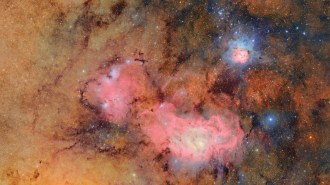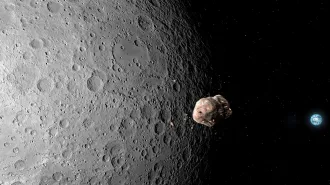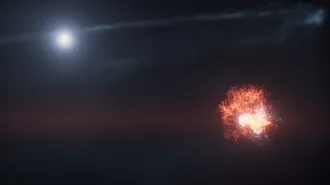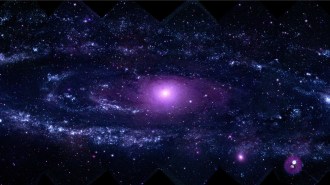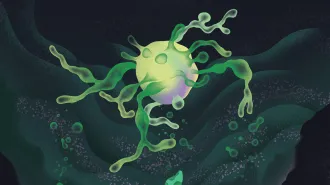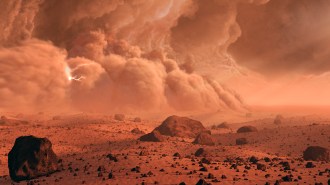AUSTIN, Texas — Astronomers might not know what dark matter is or be able to see it, but at least they know something about where it is. Using telltale distortions in light from distant galaxies, scientists have mapped out clumps and strings of the invisible stuff on a larger scale than ever before.

One set of maps, presented January 9 at a meeting of the American Astronomical Society, comes from five years of observations made by the Canada-France-Hawaii Telescope in Hawaii. The work covers an area of sky roughly one billion light years across that’s populated by more than 10 million distant galaxies. Most of the galaxies lie six billion light years from Earth, providing the team with an enormous swath of space to study.
“The dark matter map coming out of this survey has a tremendous cosmological volume,” said Rachel Mandelbaum of Princeton University and Carnegie Mellon University in Pittsburgh, who was not involved in the research.
Two other teams, from Lawrence Berkeley National Laboratory in California and Fermi National Accelerator Laboratory in Batavia, Ill., have also analyzed dark matter’s cosmic abundance in the universe on a large scale. That work, done using images taken by the Sloan Digital Sky Survey between 2000 and 2009, produced similar results, those scientists reported January 9 at the meeting.
Dark matter, which makes up roughly 25 percent of the physical universe, reveals its presence in part by warping the light from distant galaxies. Dark matter’s gravity tugs at light traveling near it, producing distorted images of galaxies that point scientists toward the location of the otherwise veiled substance. “You can imagine that dark matter is leaving its signature on the images of very distant galaxies,” said Catherine Heymans of the University of Edinburgh, a member of the first group.
She and her colleagues deduced where dark matter lurked by looking at the distorted, distant galaxies in the study areas. For years, scientists have suspected that clumps of galaxies and clumps of dark matter coincide. The new maps confirm this pattern. The most massive peaks of dark matter host “giant monsters, clusters of galaxies,” said team member Ludovic Van Waerbeke of the University of British Columbia in Vancouver. “We are very happy that this is very similar to what we’ve been expecting.”
The maps also reveal the presence of voids, enormous regions of empty space carved into the otherwise complex and knotty web of matter.
Heymans’ team’s maps cover 155 square degrees of sky; for comparison, the full moon covers about one-quarter of a square degree. The Berkeley Lab and Fermilab teams studied distorted light in a larger patch, as large as 275 square degrees. But those scientists didn’t look as far away, focusing more on dark matter’s distribution in the local universe.
The results from all three teams are similar, scientists say, which is reassuring when trying to detect something as elusive as dark matter. The Sloan results “are fantastically complementary to ours,” Heymans notes. “They’re looking at the very local universe, much closer to our history. We’re looking at dark matter evolving over this long time scale.”
That such detailed work can be done using these lensing techniques “bodes well for next generation surveys,” said Fermilab physicist and astronomer Huan Lin. “These future surveys will cover thousands of square degrees.”
The teams will continue studying the mysterious substance and hope to extend the map to cover the entire sky in the next decade or so. Heymans’ team is also working on resolving the locations of the lumps and strings in three dimensions, and testing whether Einstein’s theory of gravity holds true in the distant universe.
So far, Einstein seems to be doing OK, Heymans said. “What we’re finding is some concrete evidence that’s supporting Einstein’s theory of general relativity on these cosmological scales.”
